Think and Do the Extraordinary: 35 Years of the NC Clean Energy Technology Center at NC State University
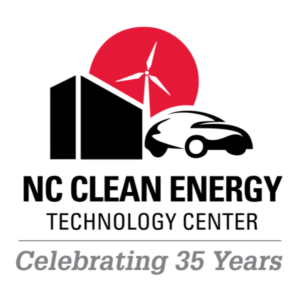 In 2023, the North Carolina Clean Energy Technology (NCCETC) at NC State University is celebrating its 35th Anniversary. NCCETC has worked closely with partners in government, industry, academia, and the non-profit community while evolving to include a greater geographic scope and array of clean energy technologies over the last 35 years.
In 2023, the North Carolina Clean Energy Technology (NCCETC) at NC State University is celebrating its 35th Anniversary. NCCETC has worked closely with partners in government, industry, academia, and the non-profit community while evolving to include a greater geographic scope and array of clean energy technologies over the last 35 years.
As a state agency respected for its assistance to the burgeoning “clean tech” sector in North Carolina, as well as one of the premier clean energy centers of knowledge in the United States, NCCETC advances a sustainable energy economy by educating, demonstrating and providing support for clean energy technologies. NCCETC has partnered with and assisted students, faculty and staff at NC State University to leverage its expertise and educational programs to create new opportunities and connect the University with the energy industry across the state.
Executive Director Steve Kalland sees NCCETC as a gateway into the university and an interdisciplinary bridge between colleges. “Throughout our history, we’ve always thought it was important to support student projects within colleges and universities,” said Kalland.
At NC State University, NCCETC has assisted departments in several colleges such as: the College of Agriculture and Life Sciences, the College of Design, the College of Education, the College of Engineering, the College of Humanities and Social Sciences, the College of Natural Resources, the Poole College of Management, the College of Sciences, the Wilson College of Textiles and the Graduate School.
Back to the Beginning
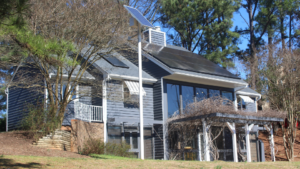
In the Solar House at NC State University, you can find the origins of the NCCETC. The Solar House was originally constructed in 1981 as part of an interdisciplinary collaboration within the College of Engineering under the leadership of principal investigators Herbert Exerlin and Al Boyers in Mechanical and Aerospace Engineering, and Ray DeBruhl in Civil Engineering.
It was designed to incorporate readily available solar and energy-efficient technologies to serve three primary purposes: (1) to demonstrate how solar and energy-efficient technologies can be effectively incorporated into a solar house of traditional design typical of the region; (2) to serve as an educational resource and laboratory for students, clubs, professional organizations and the general public; and (3) to serve as a research laboratory for graduate students in engineering, architecture, interior design and other related disciplines.
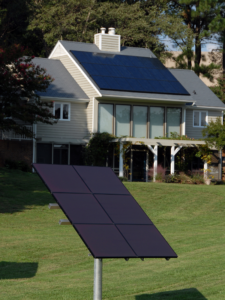
The Solar House received several national and state awards for its performance and it has been the laboratory for the thesis and project research for countless graduate and undergraduate students at both NC State and other universities. Its excellent performance and location adjacent to NC State’s McKimmon Center for Continuing Education provided NCCETC with a powerful educational tool during its first decade.
NCCETC was first established in December 1987 as the North Carolina Solar Center. The state government of North Carolina, NC State University, and the solar industry came together to launch the Solar Center with sponsorship from the State Energy Office to meet the need for a central clearinghouse that could assist the state’s citizens, businesses and institutions in using solar energy. Since its formation, the Center has concentrated a large portion of its resources to train professionals and to provide educational opportunities for decision-makers and the public to learn about solar energy.
Think and Do the Extraordinary – On Campus and Beyond
NC State is a large land-grant university with a research and extension mission. Its motto, “Think and do the extraordinary,” aims to propel NC State forward as a university that makes a difference, where faculty and students think beyond boundaries and do the extraordinary in our collective quest to solve the grand challenges of a complicated world.
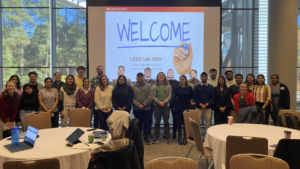 Elizabeth Bowen, Senior Project Manager for NCCETC’s Clean Power & Industrial Efficiency program, is co-founder and co-instructor for the LEED Lab course at NC State hosted by the College of Design’s School of Architecture in partnership with Dr. Traci Rose Rider. The course focuses on using Leadership in Energy and Environmental Design (LEED) for Building Operations and Maintenance as the benchmark for high performing buildings.
Elizabeth Bowen, Senior Project Manager for NCCETC’s Clean Power & Industrial Efficiency program, is co-founder and co-instructor for the LEED Lab course at NC State hosted by the College of Design’s School of Architecture in partnership with Dr. Traci Rose Rider. The course focuses on using Leadership in Energy and Environmental Design (LEED) for Building Operations and Maintenance as the benchmark for high performing buildings.
“We first started the LEED Lab course when I was working at the University Sustainability Office,” Bowen said. “The purpose was to give students real-world, hands-on experience by evaluating an existing building’s practices and identifying ways to decrease environmental impact and costs. The majority of our students have career goals to be building designers and environmental consultants”
LEED Lab is an interdisciplinary immersion course that utilizes project based learning and the built environment to educate and prepare students to become green building leaders and sustainability-focused citizens. In the course, students assess the performance of existing facilities on campus and choose one building where they will facilitate the LEED for Building Operations and Maintenance (LEED O+M) process with the goal of certifying the facility.
NC State’s “Think and Do the Extraordinary” mission is interwoven into the goals of LEED Lab. “The course is structured to break down silos between the colleges within NC State,” explained Bowen. During the course, students work in groups representing several different colleges including the College of Design, College of Natural Resources and College of Engineering.
Ultimately, LEED Lab prepares students for career success in addition to qualifying them to take the LEED Accredited Professional O+M accreditation exam. LEED Lab contributes to meeting the needs of an informed clean energy workforce by equipping students with the skills, knowledge and expertise required to be effective communicators, project managers, critical thinkers, problem solvers, engaged leaders, and team players.
“Previously, LEED Lab students have evaluated sustainability in buildings on NC State’s campus,” Bowen noted. “The 2022 LEED Lab course was the first time we got partnered with an off-campus facility.” This class partnered with Durham Public Schools and selected Lucas Middle School in north Durham as the LEED Lab subject building.
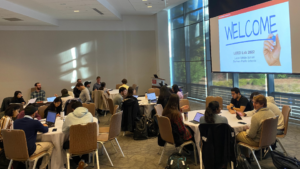 At the end of the course in November 2022, students presented the results of their work to industry professionals and the Durham Public Schools energy manager to discuss their recommendations in the areas of transportation, energy performance, waste management, light pollution reduction, pest management, innovation, grid harmonization, purchasing, site management, green cleaning, indoor environmental quality and green cleaning. “The findings from the students’ work has the potential for Lucas Middle School to earn a Gold rating in LEED O+M,” said Bowen.
At the end of the course in November 2022, students presented the results of their work to industry professionals and the Durham Public Schools energy manager to discuss their recommendations in the areas of transportation, energy performance, waste management, light pollution reduction, pest management, innovation, grid harmonization, purchasing, site management, green cleaning, indoor environmental quality and green cleaning. “The findings from the students’ work has the potential for Lucas Middle School to earn a Gold rating in LEED O+M,” said Bowen.
The B Corp Clinic is another on-campus program initiated by Bowen with an interdisciplinary scope. B Corps—like Ben & Jerry’s, New Belgium Brewing, and Patagonia—are “for-profit companies certified by the nonprofit B Lab to meet rigorous standards of social and environmental performance, accountability, and transparency.”
Since 2015, the NC State B Corp Clinic has helped North Carolina companies achieve B Corp certification by working with teams of graduate and undergraduate students from universities across the state. “I piloted the concept with NC State Poole College of Management students and College of Natural Resources students consulting to a local start up incubator.” Today, the B Corp Clinic, led by Jessica Thomas of the Business Sustainability Collaborative has massively scaled, with student involvement beyond NC State University and business involvement beyond NC borders. Bowen continues to be involved, serving as a coach for the B Corp Clinic. “It’s really exciting to be able to help companies strengthen their social and environmental impact by engaging with teams of students from universities across the state,” Bowen said.
Engaging with the Clean Energy Community
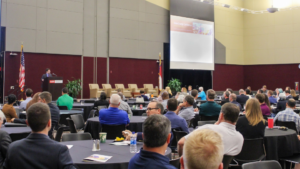 The State Energy Conference of North Carolina is an annual conference hosted by NCCETC and N.C. State University’s McKimmon Center. Over the last six years, NCCETC has grown the State Energy Conference from around 400 to over 900 attendees from a variety of backgrounds, including state and local government, non-profits, startups, academia and corporate organizations – all joined under the SEC’s theme: “Connecting North Carolina’s Diverse Energy Economy.”
The State Energy Conference of North Carolina is an annual conference hosted by NCCETC and N.C. State University’s McKimmon Center. Over the last six years, NCCETC has grown the State Energy Conference from around 400 to over 900 attendees from a variety of backgrounds, including state and local government, non-profits, startups, academia and corporate organizations – all joined under the SEC’s theme: “Connecting North Carolina’s Diverse Energy Economy.”
NC State University was named among 10 “Energy Elite” colleges and universities by the American Energy Society (AES) in 2020. NC State was recognized for its numerous energy-related degree programs and strong energy research portfolio, including centers and institutes such as NCCETC and the FREEDM Systems Center.
Previously, NCCETC led an effort to identify community colleges in the state that provide coursework on energy efficiency and renewable energy. Some of the community colleges involved were Asheville-Buncombe Technical Community College, Cape Fear Community College, Central Carolina Community College, Sandhills Community College, Wake Tech Community College and Wilson Technical Community College.
NCCETC also has strong linkages to other UNC-system institutions, most notably the Center for Energy Research and Technology at NC Agricultural and Technical (NC A&T) State University and the Appalachian State University Energy Center. Other partnerships have included collaborations with The University of North Carolina at Chapel Hill, Fayetteville State University, the University of North Carolina at Charlotte, Davidson College, Wake Forest University, the University of North Carolina at Wilmington, NC Central College, and Elizabeth City State to name a few.
The internship program at NCCETC was first developed in 2014 in order to better serve undergraduate and graduate students at NC State University and beyond. NCCETC has hosted graduate students from Duke University’s Nicholas School of the Environment and Sanford School of Public Policy as interns in the Policy and Biomass programs.
The US Department of Commerce’s Economic Development Administration awarded a $23.7 million American Rescue Plan Good Jobs Challenge Grant to NC A&T near the end of 2022 to support the creation of STEPs4GROWTH, or Successful Transitions and Effective Partnerships for Growing Regional Opportunities in the Workforce to Harness, a clean energy workforce training program that will start in high school and continue through college.
Staff from NCCETC’s Training program are currently supporting NC A&T’s proposal to create STEPs4GROWTH, a clean energy workforce training program. This project directly aligns with NCCETC’s mission as a public service center seeking to advance a sustainable energy economy.